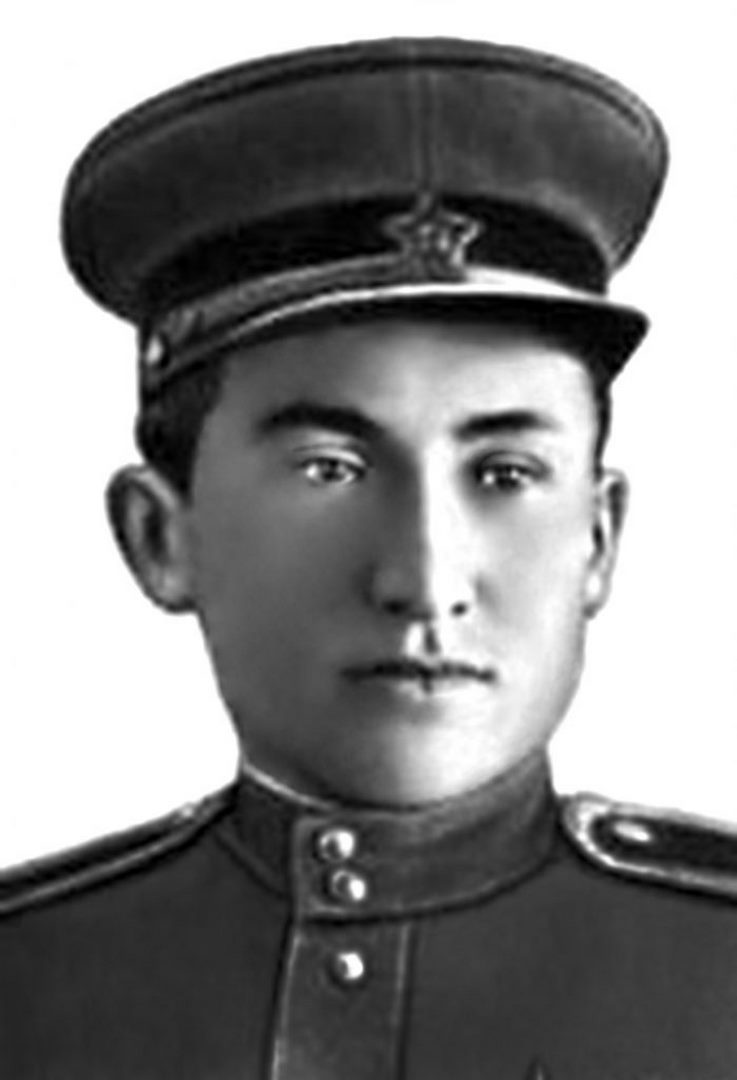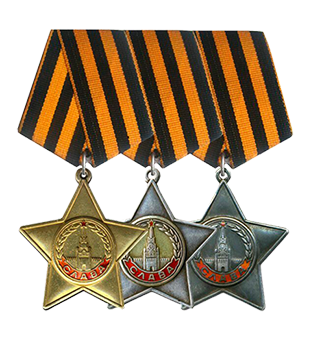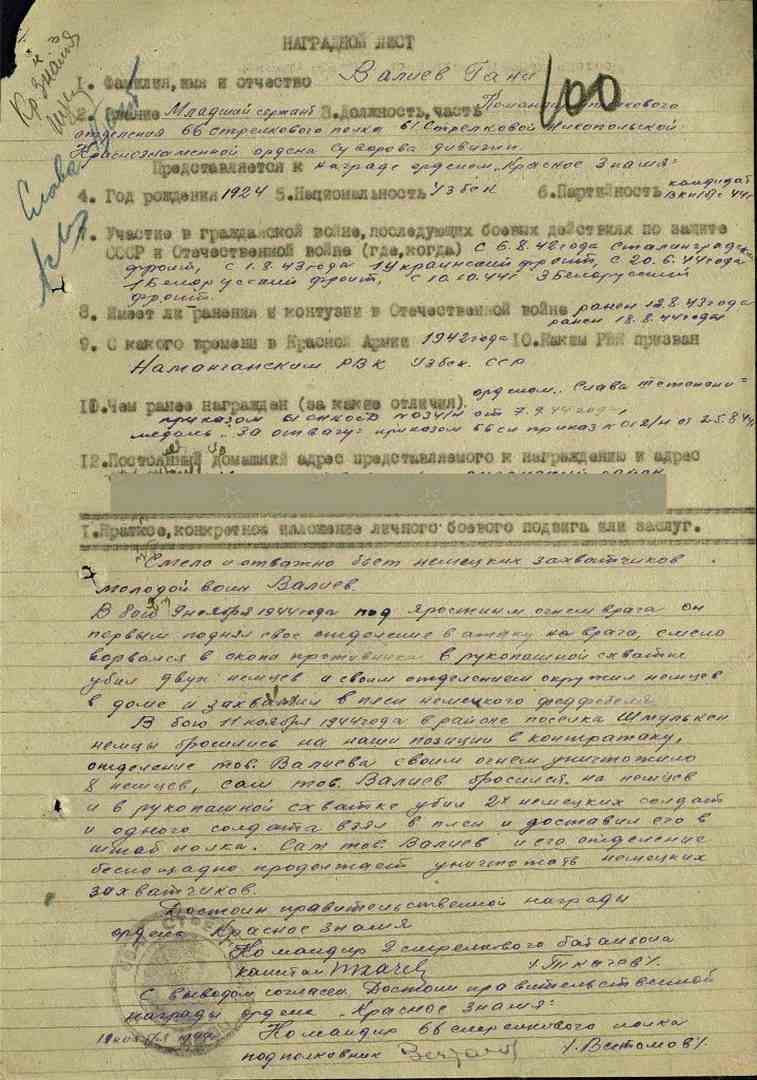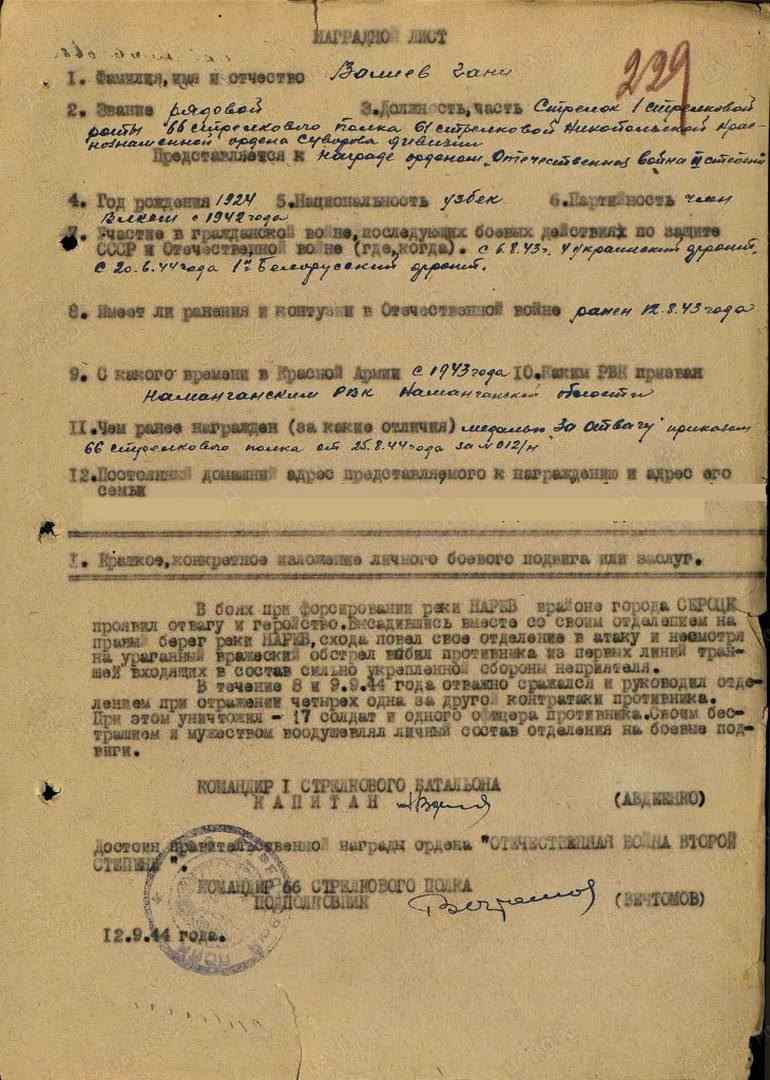
VALIYEV GANI
staff sergeant, a participant in World War II, Full cavalier of the Order of Glory (May 15, 1946)
Born on July 15, 1924 in the village of Kurmak, now in the Namangan region of the Namangan region. From a peasant family. Uzbek.
In June 1942 he was drafted into the Red Army by the military commissariat of the Namangan region of the Uzbek SSR. On the fronts of World War II from December 1942. He fought on the Stalingrad and Southern fronts, a participant in the Battle of Stalingrad.
In the battles of August 12, 1943, during the liberation of Donbass and August 11, 1944 in Poland, he was twice wounded. After recovering in 1943 and until the end of the war, he fought in the 66th Rifle Regiment of the 28th Army in the 4-Ukrainian, from June 1944 -1-Belorussian, from October 1944 – on the 1-Belorussian, from April 1945 – on the 1-Ukrainian fronts . Shooter of the 66th Infantry Regiment (61st Infantry Division, 128th Infantry Corps, 28th Army, 1st Belorussian Front) Red Army Valiev Gani courageously acted in battles to keep and expand the Serotsky bridgehead on the Narev River.
With the soldiers of his squad, one of the first on September 8, 1944, under powerful enemy fire, forced Narew in the vicinity of the city of Serock (Poland), immediately from the water edge he led his squad into the attack and burst into a German trench, where he engaged in hand-to-hand fighting. These courageous actions contributed to the success of the seizure of the bridgehead in this area. In the battles for the bridgehead on the right bank of the river on September 8 and 9, the squad repelled 4 enemy counterattacks. Personally destroyed 17 German soldiers and 1 officer.
«For the exemplary performance of command assignments in battles against Nazi invaders», by order of the units of the 61-threaded division of September 27, 1944, Red Army Valiev Gani was awarded the Order of “Glory” of the 3rd degree.
The commander of the rifle group of the 66th rifle regiment (same subordination, 3rd Belorussian Front), Junior Sergeant Valiev Gani again distinguished himself in local offensive battles, which were conducted in order to occupy an advantageous position to launch the East Prussian offensive operation. In a battle on November 9, 1944, near the city of Gumbinnen (East Prussia), under heavy fire, he launched an attack on his squad, was the first to break into the German trench and, in hand-to-hand combat, destroyed 2 soldiers. In the same battle captured the German sergeant major.
On November 9, his unit near the village of Shmulken was subjected to a surprise attack by the enemy, but the soldiers were not at a loss and met the enemy with organized fire. Having lost 8 soldiers killed on the spot, the attacking Germans lay down and at that moment Valiev raised the squad in a counterattack. In hand-to-hand combat, Junior Sergeant Gani Valiev on the spot exterminated 2 enemy soldiers and personally captured another one. The soldiers of his squad also destroyed several Nazis.
For the exemplary performance of the combat missions of the Command at the front of the fight against the German invaders and the valor and courage shown at the same time by the order of the commander of the 28th Army on December 18, 1944, Junior Sergeant Valiev Gani was awarded the Order of Glory of the 2nd degree.
The assistant commander of the foot reconnaissance platoon of the 66th Infantry Regiment (the same subordination, 1st Ukrainian Front), sergeant Valiev Gani fearlessly fought in the Berlin offensive. During the storming of Berlin on April 27, 1945, with his scouts, he blocked a German bunker, arranged in one of the buildings, and stopped with his fire the advance of the assault groups. With a risk to their lives, the scouts came close to him and blew up with the German soldiers who were in it.
By decree of the Presidium of the Supreme Soviet of the USSR of May 15, 1946 «For the exemplary performance of command assignments in battles against Nazi invaders», guards staff sergeant Valiev Ganiyereden the Order of Glory of the 1st degree.
In April 1946, Sergeant G. Valiev was demobilized. He lived in the city of Namangan.





